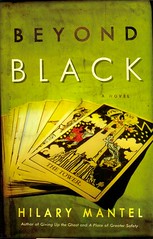Beyond Black
This is a very difficult book to write about because, quite frankly, I hate it. But I don't hate it because it is a bad book; more because it is very good but has such an incredibly bleak point of view - a world where everyone is your fiend. It has a very interesting premise and is brilliantly written: Mantel has a very sharp, clever and quite intense writing style.
Alison, we are repeatedly told, is very fat, in a life threatening way, with no apparent ability to do anything about it. She is possibly fat because of the awful things done to her as a child - her mother was a prostitute with no ability to care about her child at all. Mum in fact put her on the game when she was "nine, ten, or eleven" but "if anyone asks, say you're sixteen". Her customers are none too salubrious either, as you might imagine: what kind of man wants to be with someone that young? They are involved in various dodgy activities: dog racing, spirit and cigarette smuggling - low rent crooks. As it turns out, Alison is quite the spirited child and is quite capable of damaging these men. Good for her.
So - that is Alison's childhood. She has an escape, however: she has psychic abilities, is in touch with "airside" spirits. One emanates when she is still very young, a kindly old lady who sits in the corner and gives her toys to play with. I don't think there is any suggestion made anywhere that Al is simply gone mad - an early chapter establishes her authenticity as someone who can genuinely communicate with those who have passed, as well as with her real life audience. She is bloody good at what she does. We get to live the life of someone with special powers; it is presented as just another occupation, although with a higher than normal quota of charlatans and fakers. For a number of years, things go OK for Al - so well, in fact, that she needs a manager to look after affairs earthside - making bookings, getting food, driving her around and the like. This is Colette, who sticks around for seven years as her "manager" - and gets increasingly managerial and horrible with the years. Colette has broken up with Gavin but refuses to accept she is still obsessed with him, despite always talking about him and inventing relationships to compete with his own (invented) relationship with Zoe the supermodel.
Colette and Alison form a team: many think they are "lezzoes", leading to this little speech from Suzi, who is trying to sell them a grotesque parody of a house, and has just been told that Al and Colette that they are buying together:
Certainly. Oh, yes, of course. We don't discriminate. Far from it. Far on the other side. We've been away for a training day. We are enthused to play our part to enhance the diversity of the community.Of course, Suzi is just awful and so are all the people who end up living in this new development, to the point that they get up a petition to get rid of the lezzoes.
Sometimes, you wonder what the target of this book is, whether it is working with the idea of psychics or is parodying the banality of everyday life, and its increasing homogenisation. There are blackly hilarious speeches from Aitkendside, who has been appointed (by "Nick") "team leader" of a little group of spirit guides and adopts typical line management speech patterns. There are other attacks - such as the sustained one on modern housing developments (they are both banal and poisonous) which fits in with society's inability to embrace diversity.
While there is quite a focus on the relationship between Al and Colette, the primary relationship is between Al and her spirit guide, Morris. He is dead, but can manifest to Al - as an ugly, yellow faced horrible little man. He can't be seen by non-Sensitives but can alter the physical world - which he takes delight in doing - stealing things, breaking things and the like. His function is apparently to direct traffic airside, so that the "right" spirits communicate with Al. But this is where things get really really horrible: all of his mates are the same guys that screwed up Al's childhood, and they keep showing up now in her life. Al is still alive at the end of the novel, but you just know that death won't provide any kind of release for her.
Luckily, there were brilliant little episodes to help the reader gain a little sunlight, although these grew further and further apart as the book progressed. I love this, from p 69:
On Windsor Bridge, a young boy was sitting on a bench with his Rottweiler at his feet. He was eating an ice-cream cone and holding another out to the dog. Passersby, smiling, were collecting to watch. The dog ate with civil, swirling motions of his tongue. Then he crunched the last of his cornet, swarmed up onto the bench and laid his head lovingly on the boy's shoulder. The boy fed him the last of his own ice-cream, and the crowd laughed. The dog, encouraged, licked and nibbled the boy's ears, and the crowd went ohh, feech, yuk, how sweet!In the final two chapters, things closed in on Al completely - starting with the death of one of her colleagues. Much that has been hinted at in prior chapters is then made clear in the final one, as Al works back through her life and takes a clear look at her childhood.
The dog jumped down from the bench. Its eyes were steady and its paws huge. For two pins, or the dof equivaelbnt, it would set itself to eat the crowd, worrying each nape and tossing the children like pancakes.


